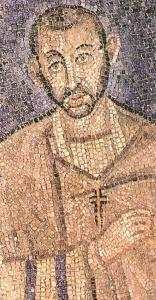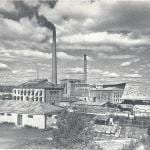Thee alone I follow, Lord Jesus, Who heals my wounds. For what shall separate me from the love of God, which is in Thee? Shall tribulation, or distress, or famine? I am held fast as though by nails, and fettered by the bonds of charity. Remove from me, O Lord Jesus, with Thy potent sword, the corruption of my sins. Secure me in the bonds of Thy love; cut away what is corrupt in me. Come quickly and make an end of my many, my hidden and secret afflictions. Open the wound lest the evil humor spread. With Thy new washing, cleanse in me all that is stained. Hear me, you earthly men, who in your sins bring forth drunken thoughts: I have found a Physician. He dwells in Heaven and distributes His healing on earth. He alone can heal my pains Who Himself has none. He alone Who knows what is hidden can take away the grief of my heart, the fear of my soul: Jesus Christ. Christ is grace! Christ is life! Christ is Resurrection! Amen.
 Today I had a long teleconference with some wonderful people . . .the kind that make you glad to be part of the Church. They were concerned about the world, but calm and carrying on. They showed courage: a rational understanding of the medical and economic dangers of the times with a refusal to panic or retreat into daydreams.
Today I had a long teleconference with some wonderful people . . .the kind that make you glad to be part of the Church. They were concerned about the world, but calm and carrying on. They showed courage: a rational understanding of the medical and economic dangers of the times with a refusal to panic or retreat into daydreams.
What if feelings of panic arise? What if we grow tired and wish to retreat to endless TCM movies?
We begin in prayer honest to God admitting how we really feel. Our feelings, one pastoral counselor once said to me, are our feelings. Like the weather, they are there, we are not always responsible for them, and need not judge them. They are. Having said they are, we can then decide if they are a sign to do anything.
If I read an article proclaiming our imminent doom, feelings of panic might arise. I should then stop, put the article down and ask: “What would I do differently? Can I really, at this point, prepare for what is being described?” “Perhaps when the doom develops, the best strategy would be to love God, love my neighbor, and do my duty?” If RMS Culture has ripped open too many watertight compartments, then let’s face the uncertain future like ladies and gentlemen. We misunderstand the expression “the band played on.” Those noble men played on to calm passengers and because if the end is coming what better way to meet it than music? Instead of panic, let’s play on. At the worst, we will have left a legacy of courage.
But then the worst almost never happens and I can just as easily pick up an article full of good news that tells me that soon, in a few months, if we do not panic, that all will be well. In fact, having learned a thing or two, we will be in very good times indeed. When I read this, then feelings of euphoria, might bring needed calm. There is still much that can be done and needs to be done. Normal duties must get focused attention. I should then stop, put the article down and ask: “What would I do differently? Can I really, at this point, prepare for what is described?” “Perhaps when the good days come the best ‘strategy’ would be to love God, love my neighbor, and do my duty?” If V.V. Day is coming soon, if a long shot therapy pans out and we celebrate victory of the virus, then we can celebrate our heroes: the medicos on the front lines, the researchers, the companies who kept us going. Meanwhile, the rest of us will have won our bit and enjoy some jollification. At the best, we will have left a legacy of courage.
Most likely, we will muddle through between the two extremes. Our feelings of irrational panic or euphoria were not “bad,” though acting on them might be!
All of this comes to me as I have prayed for five days the prayer of Saint Ambrose, because the prayer focuses on the real problem for me: sin, falling woefully short of love. The outcome of the particular problems of Rome, and Rome had grave general and plaguish particular problems in Ambrose’s day, are not the focus. Eternal things are the key in this prayer for healing. We wish for healing of our bodies, yet our deepest desire is to become healed in our hearts. We hope all are healed in their hearts, if they wish to be healed.
What is the response of such an honest prayer? What happens when we name our fears and false euphoria and look past them to eternity? We gain every so often an eternal vision. We see what is true, what Saint John saw at the end of his visions. Foolishly, we recall his apocalypse for the figures he paints, the terrors of the world he acknowledges, but all of that is dismissed at the end in perfect beauty, justice, and joy. Only a coward gets stuck in Inferno, fails to follow Dante through his Purgatory. The final meaning comes when Dante, a mortal man, sees utterly sublime beauty and then returns to Earth. He does not stay in Paradise, but comes back and gives us a divine Comedy.
We can take our own glimpse of heaven and shout eternal truth: Christ is grace! Christ is life! Christ is resurrection! We do not shout this in heaven. We proclaim this in prayer here in Middle Earth as we work out our salvation in fear and trembling. We feel, we think, we pray, we proclaim, then we act.
Lord Jesus Christ, son of God, have mercy on us.
*Who can be sure?












